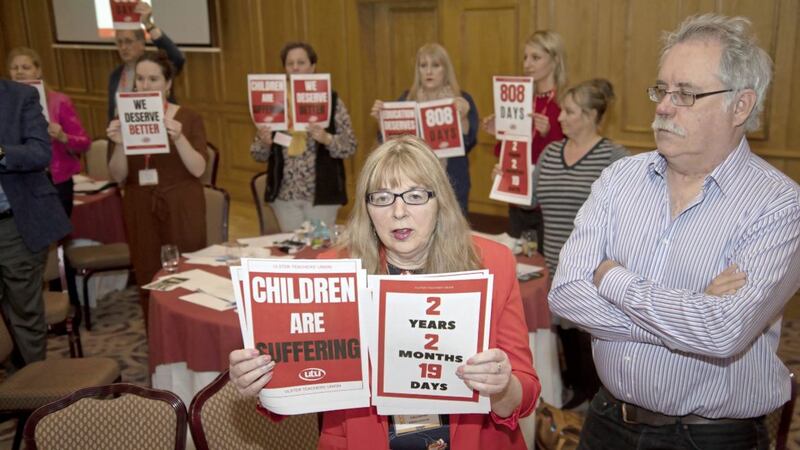TEACHERS need more support to help cope with additional challenges caused by a rising number of looked-after children.
The Ulster Teachers' Union (UTU) conference in Newcastle heard there was a risk that a generation of young people were being set up to fail.
Members were told that classroom staff required training and resources to deliver "very particular support".
Children are taken into care for a variety of reasons, the most common being to protect them from abuse or neglect.
In other cases their parents could be absent or may be unable to cope due to disability or illness.
The number of children in care has increased every year since 2011.
UTU deputy general secretary Jacquie White said less than a quarter of looked-after children (LAC) achieved at least one GCSE, compared to 80 per cent of all pupils.
More than 3,000 children are now in care either in residential homes, with foster carers or with a relative or friend.
"That's 3,000 children who aren't likely to achieve the kinds of qualifications they need to survive in life," Ms White said.
"It's crucial then, not just for them but for our wider society, that this changes so these young people become valued and valuable members of society otherwise we risk perpetuating the poverty cycle – about 40 per cent of LAC children are from deprived backgrounds.
"Often, however, the traumas many of the LAC pupils have experienced at home manifest themselves in deeply challenging behavioural issues at school and teachers are struggling to cope."
Many of these traumas, the conference heard, manifested themselves in attachment issues which Ms White said were very different to issues arising from behavioural or mental health issues and demanded very specialised training to manage.
"The teacher's role in these children's lives is especially important given the often fractured nature of their home lives. The teacher becomes one of their main care givers yet they're crying out for help.
"The care of these children can't be allowed to simply become a box-ticking exercise to fulfil the latest well-intentioned but hollow directives from central government. It's not just their education at stake - it's their prospects for the future, their whole life's experience.
"Many of the LAC pupils will already have experienced the kinds of traumas that few of us can even imagine. Having `saved' them from this the system owes it to them to follow through."
The conference also heard that `last resort' learning units for children who could not sustain a mainstream place were "groaning under the strain".
Delegates were told teachers were often unknowingly working with violent young people.
More than 600 young people are in Education Other Than At School settings.
::::::
Startling figures have found that one in one in five education workers are physically abused once a week. Attacked and threatened too often, UTU member Jean is leaving teaching after 25 years:
I'm leaving teaching because I just don't want to go to work every day knowing I could be attacked. I could be physically or verbally abused and I don't want to have to defend myself any more. It's no way for anyone to live.
We even have to have `resilience training' now. It's what you need to survive on the teaching frontline today.
The situation has deteriorated in recent years with parents seeming to think it's acceptable to shout and threaten you if they disagree with something.
I have had a father lunging across the desk at me, I've been threatened with violence, I've had derogatory things written on social media. I now often need to have another teacher in the room if I'm meeting a parent.
After one particularly intimidating incident I had to take time off work. It took a long time for me to feel safe in school again.
Once I would have been happy to work late at school on my own but after that incident I was too afraid. I was nervous walking to the car in the dark on my own.
Even when physical force isn't involved – either explicitly or implicitly – parents can threaten to refer you external bodies. While they are perfectly entitled to so it's utterly unreasonable to place this kind of pressure on professionals who are doing the very best they can for children within the resources available and the existing framework.
I used to wake up in the middle of the night worrying about work so the stress was impacting my family life too. At home, if someone asked me something very reasonable about work I'd find myself getting even more stressed simply because I couldn’t bear to talk about it.
Also because of the confidentialities involved I couldn't share many of the burdens so my family couldn't appreciate what I was going through. When you're in the middle of all this that sense of fear and dread is always there. It never goes away. It's no way to live when you’re trying to do an honourable job.








